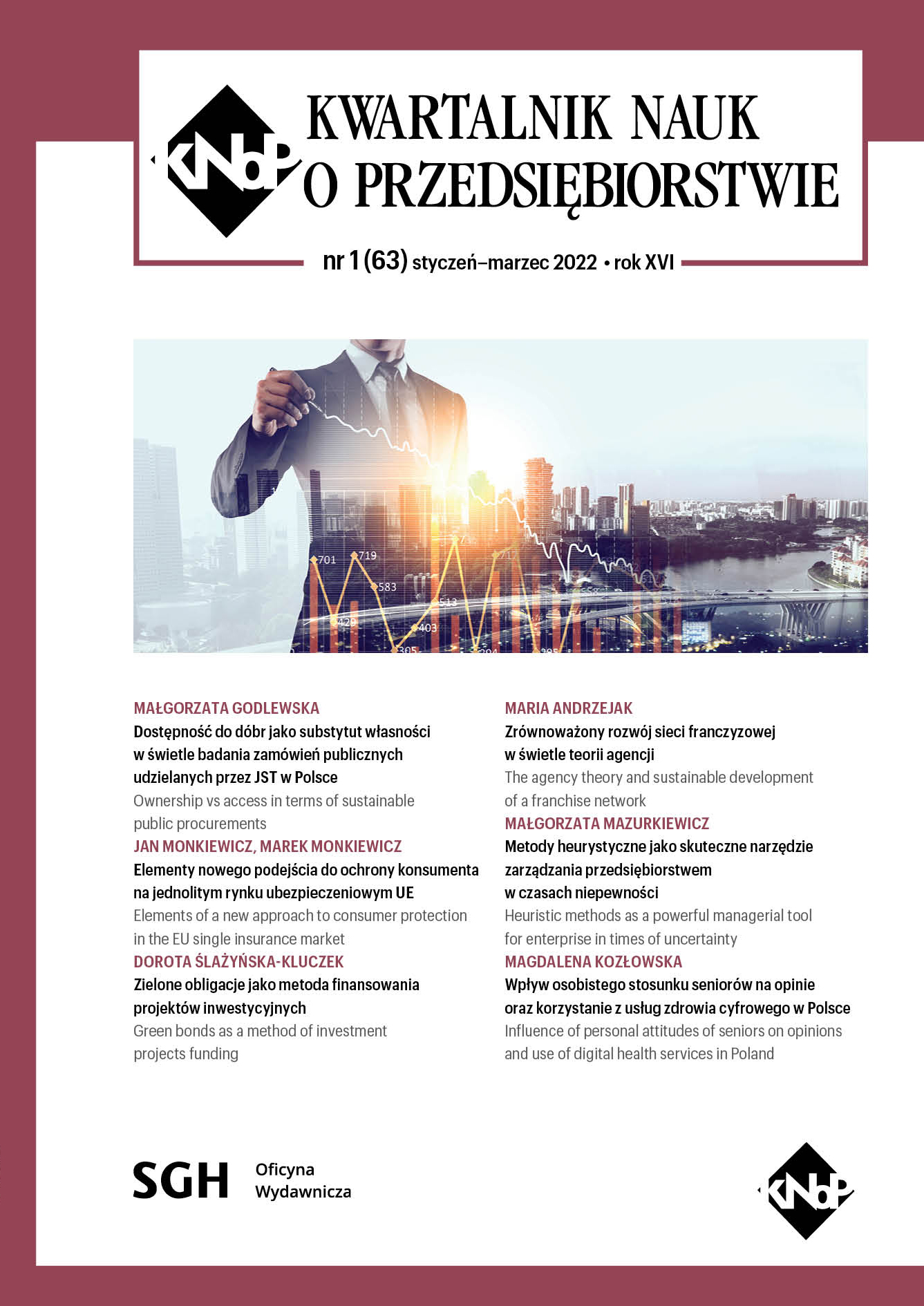The agency theory and sustainable development of a franchise network
Main Article Content
Abstract
The article presents the problem of the free rider effect in the context of sustainable development standards. The aim of the article is to assess activities for the sustainable development of the franchise network and their effectiveness in comparison with the free rider effect occurring in the agency’s theory. The principal-agent conflict (franchisor-franchisee) and opportunistic behaviour on the part of franchisees may weaken the introduced changes. The article is based on a review of Polish and foreign literature on the subject. Moreover, an analysis of the principal-agent conflict resulting from the agency theory was performed in comparison with the standards of sustainable development and good practices introduced by franchise networks. Conclusions resulting from the critical analysis of the literature suggest the possibility of reducing the effectiveness of actions for sustainable development through opportunistic behaviour of franchisees. A control system is required to limit them. In addition, the active participation of franchisees contributes to the effectiveness of good practices implemented by the network.
Downloads
Article Details
The author of the article declares that the submitted article does not infringe the copyrights of third parties. The author agrees to subject the article to the review procedure and to make editorial changes. The author transfers, free of charge, to SGH Publishing House the author's economic rights to the work in the fields of exploitation listed in the Article 50 of the Act of 4 February 1994 on Copyright and Related Rights – provided that the work has been accepted for publication and published.
SGH Publishing House holds economic copyrights to all content of the journal. Placing the text of the article in a repository, on the author's home page or on any other page is allowed as long as it does not involve obtaining economic benefits, and the text will be provided with source information (including the title, year, number and internet address of the journal).
References
2. Blisko i odpowiedzialnie, Raport społecznej odpowiedzialności biznesu Żabka Polska; https://www.zabka.pl/raport-csr-pl, dostęp: 16.05.2021.
3. Europejski Kodeks udzielania Franczyzy, https://franczyza.org.pl/europejski-kodeks-etyki-udzielania-franczyzy, dostęp: 16.05.2021.
4. Gillis W., Combs J. (2009), Franchisor strategy and firm performance: making the most of strategic resource investments, “Business Horizons”, Vol. 52, s. 553–561.
5. https://www.zabka.pl/nasza-odpowiedzialnosc/ochrona-srodowiska, dostęp: 14.05.2021.
6. Huang C. (2004), Agency Theory in Franchising Some Empirical Results, “Yu Da Academic Journal”, No. 7, s. 158.
7. Kidwell R. E, Nygaard A., Silkoset R. (2007), Antecedents and effects of free riding in the franchisor-franchisee relationship, “Journal of Business Venturing”, February 2007.
8. Klick J., Kobayashi B., Ribstein L. (2006), The Effect of Contract Regulation: The Case of Franchising, George Mason Law & Economics Research Paper, No. 07–03, s. 3.
9. Lafontaine F. (1992), Agency Theory and franchise some empirical results, „Rand Journal of Economics”, Vol. 23, No. 2.
10. Manna D. R., Smith A. D., Synowka D. P. (2006), Exploring Agency Theory Implications With Franchising, “Journal of Business & Economics Research (JBER)”, Vol. 4, No. 4.
11. Michael S. C., Combs J. G. (2008), Entrepreneurial failure: the case of franchisees, “Journal of Small Business Management”, Vol. 46, No. 1, s. 73–90.
12. Raport Odpowiedzialny biznes w Polsce (2020). Dobre praktyki., Forum Odpowiedzialnego Biznesu, Warszawa, 2020.
13. Shane S., Spell C. (1998), Factors for new franchise success, “Sloan Management Review”, Vol. 39, No. 3, s. 43–50.
14. Turek I. (2011), Identyfikacja wartości przedsiębiorstw franczyzowych, „Zeszyty Naukowe Uniwersytetu Szczecińskiego. Finanse, rynki finansowe, ubezpieczenia”, nr 46.
15. Watson A., Johnson R. (2010), Managing the franchisor – franchisee relationship: a relationship marketing perspective, “Journal of Marketing Channels”, Vol. 17, No. 1, s. 51–68.

